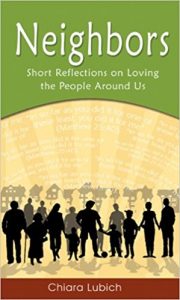Neighbors: Short Reflections on Loving the People Around Us
 “Your neighbor is the person next to you in the present moment,” Chiara Lubich explains at the outset of this small book of reflections on a central theme in her spirituality.
“Your neighbor is the person next to you in the present moment,” Chiara Lubich explains at the outset of this small book of reflections on a central theme in her spirituality.
Each neighbor of ours “is like the archway through which we must pass in order to reach God,” says Lubich, founder of the Focolare movement in the church. Born in 1920, she died in 2008.
I am happy to mention this new book at Christmastime. This is, after all, a great season of hospitality, when people everywhere renew their bonds with neighbors of all kinds. The hope of many is that, included among those “next to” them at this time of year, will be the people they know and love most profoundly.
Of course, Lubich’s notion of neighbors extends quite far — to the poor, the sick, those searching for life’s meaning, enemies and many others, including people “we sometimes don’t notice.”
In exploring the commandment to love both God and neighbor, the Focolare leader does not romanticize the role of others in our lives. She indicates that if our neighbors offer “a foretaste of heaven” to us, they may at times become our “purgatory” as well.
But in her thinking that does not mean neighbors stand between us and God or serve as obstacles to our personal spiritual growth. Instead, she was convinced that it is “through our neighbor that we continually pass from an empty and meaningless life to a full life.”
Her insight was that “we should love those who draw near to us as God loves them, each one of them, one at a time.” Isn’t that just what parents, grandparents and other family members want to do and what they hope for in a particular way at this time of year?
“Neighbors” could be read in a very brief amount of time, though I do not recommend that. I benefited by turning and returning to the book over a period of more than a week, reading and rereading a few pages, and allowing Lubich’s insights to penetrate my awareness.
The reason for reading Lubich in this case, I think, is to allow her reflections to sink in and to internalize what she proposes about the Christian meaning of our relationships and encounters with all whom she identifies as neighbors.
Bill Hartnett compiled Lubich’s reflections in “Neighbors” and wrote a Foreword for the book. A Focolare member for more than 35 years, Hartnett has translated several books by Lubich, including “Chiara Lubich: A Biography,” recently published in the U.S. by New City Press.
Hartnett suggests that “the neighbor” is “a lens through which all” of Lubich’s spirituality of communion can be examined. Unique to this spirituality “is the constant presence of others, of neighbors with whom we are to be drawn into unity,” he writes.
Is this a book of family spirituality? Though not presented under that heading, I suspect many will apply it to family life, finding that it casts light on the meaning, in the Christian vision of things, of the complexities of family relationships, which we may experience as highly rewarding, but equally demanding.
The reflections in “Neighbors” do not point in the direction of a “detached sentiment of good will,” but of “concrete and personal love for real people” that involves “effort, action and heart,” according to Hartnett.
Lubich’s reflections not only help define who our neighbors are, but point out their essential role in the lives of Christians. “We can’t go to God alone, but we must go to him with our brothers and sisters, since he is the Father of us all,” she insists.
Our neighbor, Lubich writes, is “one of the straightest roads to God.” She encourages readers to see that in “every neighbor, rich or poor, ugly or pretty, capable or not,” it in fact “is Jesus who draws near.”
Her advice is to “do as God does: not wait to be loved, but be the first to love.”
About the reviewer
David Gibson is a longtime, now retired, member of the Catholic News Service staff.
Disclaimer: Book reviews do not imply and are not to be used as official endorsement by the USCCB of the work or those associated with the work. Book reviews are solely intended as a resource regarding publications that might be of interest to For Your Marriage visitors.




